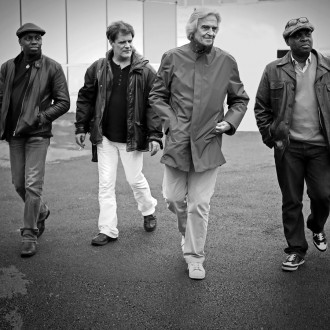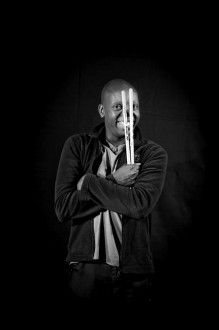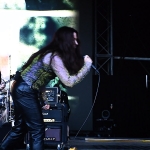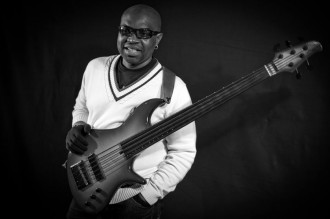John McLaughlin & the 4th Dimension

John McLaughlin on TO THE ONE
“I am at the mercy of inspiration,” reflects guitarist and composer John McLaughlin. “In 2009, I had no intention of making a recording - but then this music started to come, without any call from my part.” In fleeting, unexpected moments, the music arrived: a riff, a chord progression, a rhythmic fragment. “I would be in a restaurant with my family,” he says, “and I’d have to reach for a napkin, just to write down an idea. When an idea comes, you have to get it down, or else, before long, it’s gone.”
The music that appeared to him was strangely, hauntingly evocative - its roiling rhythmic swells, modal expanses, and telepathic group interaction echoed back to him a formative influence, and another time in his life. “It reminded me of a very powerful inspiration,” McLaughlin recalls, his voice still filled with wonder over four decades later. “It took me back to 1965, to when I first heard A Love Supreme.” The resultant album, To The One, will be released via Abstract Logix and Mediastarz Monaco on April 20, 2010. No slavish imitation or sentimental tribute, To The One takes on the artistic and spiritual challenges first offered by Coltrane’s jazz masterpiece while making extensive use of the pioneering musical and technical vocabulary that McLaughlin has honed since the beginning of his long and varied career.
“A Love Supreme came at a very opportune moment for me,” he remembers. “I was 23 years old at that time, and struggling with questions of existence that we all confront sooner or later. Some of us discard them or don’t bother to delve deeper, but that’s not my nature. I was asking big questions: What is the meaning of life? What is this word ‘god’? What is this spirit? It was then that Coltrane came along and single-handedly brought this dimension of spirituality into jazz… it was a pivotal experience to me. It was so encouraging to me in both my musical and spiritual quests. To The One, as an album, is about those two aspects of my life - music and spirituality - crystallized by this recording of Coltrane’s, and how A Love Supreme coincided with my search for meaning in life.”

The six original compositions on To The One were mostly written in July and August of 2009, and set down in the studio in November and December, with very few overdubs, by McLaughlin’s current performing outfit, the Fourth Dimension: Gary Husband (keyboards, drums), Etienne M’Bappe (electric bass), and Mark Mondesir (drums). Compositional devices clearly inspired by Coltrane are fused with elements of McLaughlin’s own multi-faceted approach, all delivered with a group empathy and shared vision that harkens back to Coltrane’s fearless mid-‘60s quartet of Elvin Jones, McCoy Tyner, and Jimmy Garrison. The effect of Jones’ kaleidoscopic approach to rhythm and drumming is especially felt, brilliantly recast and explored via McLaughlin’s gift for complex metrical structures. “Even before I formed the Mahavishnu Orchestra,” McLaughlin explains, referring to his now legendary exploratory outfit of the early-to-mid 1970s, “I have been fascinated by these rhythms and their challenges. To be able to improvise fluidly over a harmonic structure is freeing, but to do it over a complex rhythmic structure adds spice. Thankfully, I’ve had the chance to play with some of the most outstanding drummers in the world.”
McLaughlin’s remarkable journey from has found the humble, dedicated Englishman performing alongside some of the twentieth century’s most provocative and visionary figures - enhancing their music with his searching, searing guitar work. “For me,” he explains, “it started with guitar players: Big Bill Broonzy, Leadbelly, Muddy Waters in his acoustic days. Before that, all I heard was classical music… my mother was an amateur violinist, and I studied piano from ages eight until eleven. But the whole world changed when the guitar and the Mississippi blues arrived. Then came flamenco, and then Django - that was my entrance into jazz. I got caught by Miles Davis on that Milestones record that came out in ‘58. Trane was on it. This was a revolution for me and I forgot about the guitar players. Jazz became my school. I was so taken by it, it wouldn’t let me go and I wouldn’t let it go. Coltrane and Miles revolutionized jazz - it was phenomenal. Hearing the musicians - Elvin Jones, McCoy Tyner, Herbie Hancock, Tony Williams… and then to get to work with Tony and Miles, that was wonderful for a European musician.
|
|

|

The Answer |
LATEST GALLERY IMAGES

Alanis Morissette 
Where Israel Goes, Misery Follows |
|
|


